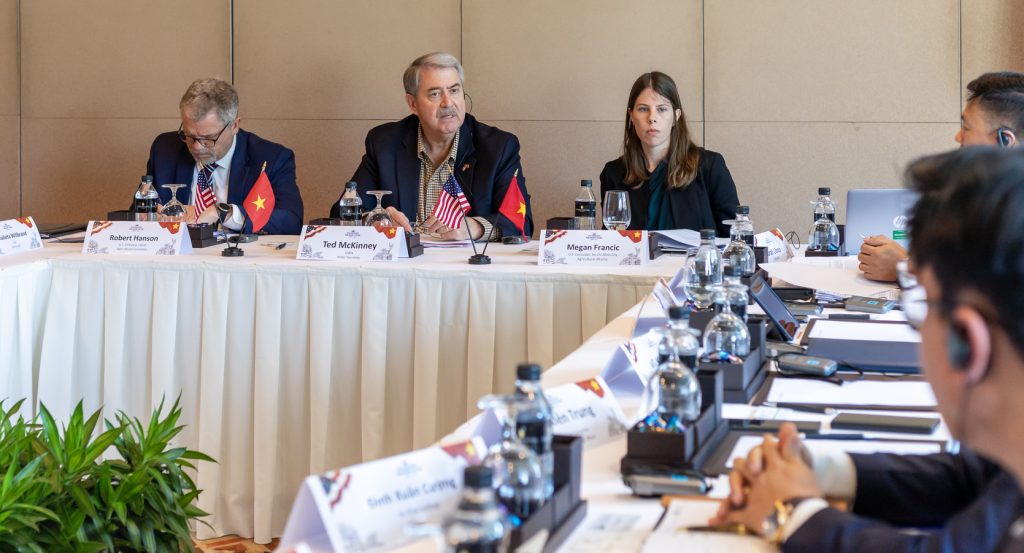Relationships are a primary driving force behind trade – a principle that was demonstrated during each meeting of the U.S. Department of Agriculture’s Agricultural Trade Mission (USDA’s ATM) to Vietnam in mid-October, led by Under Secretary for Trade and Foreign Agricultural Affairs Ted McKinney.
Wayne Humphreys, corn farmer from Columbus Junction, Iowa, who represents the corn sector on the U.S. Grains Council (USGC) Board of Directors, joined USGC staff for the mission, which included nearly 80 industry and government representatives. Humphreys’ participation as an engaged producer accentuated the importance of the interconnectedness between U.S. farmers and agribusiness, and other organizations like the Council in establishing, maintaining and expanding trade opportunities.
“I particularly appreciated being a part of this mission and others because when you sit across the table from these people and say you are a family farmer or an American farmer, you get the distinct impression that is a good thing,” Humphreys said. “We are held in high regard for our productivity and for the amount of volume that we handle per person and per man-hour.”
Vietnam is the fastest-growing economy in Southeast Asia, thanks to increasing population, urbanization and rapid economic growth. In less than a decade, Vietnam has grown from a top 10 to a top three corn importer in the world. The country is a significant importer of both U.S. corn and DDGS with additional future potential for U.S. sorghum. A rising middle class is also creating additional demand for ethanol, aided by a nationwide E5 policy that has ambitions to expand to E10. Vietnam imported 3.51 million gallons of U.S. ethanol in the 2018/2019 marketing year, more than tripling sales from the year prior.
During the trade mission, Humphreys and Council staff participated in two different roundtable meetings with Undersecretary McKinney – one focused on ethanol and bioplastics and another with grain traders. Each meeting emphasized the Council’s well-known reputation as a partner in the trade and with Vietnamese producers working to expand their operations and address challenges like Asian Swine Fever (ASF).
“They have great respect for the Council. They know we have been in business a long time and we have been working in that part of the world for a long time,” Humphreys said. “We are not just blowing in there because the market is a hot spot.”
The USGC team traveled to Myanmar following the official USDA trade mission to meet with key stakeholders in the frontier Southeast Asian market. Myanmar is home to 54 million people with tremendous potential for U.S. grain and co-product exports. However, restrictions on foreign investment related to political turbulence within Myanmar limited market development activities until 2018. Since then, the Council has been engaging with key stakeholders in the market, targeting aquaculture, animal feed and potable ethanol industries.
“Myanmar is a classic example of an emerging market,” Humphreys said. “The people are learning how to be part of the international community. We learned long ago to be patient with emerging markets and help them develop their policies.”
In both markets, Humphreys observed the importance of the Council’s on-the-ground presence and emphasized the overarching need to continue to establish connections, not just promote sales.
“The business of the Council and the business of the American farmer around the world should be focused on developing relationships,” Humphreys said. “That means consistency; that means trust; that means honesty; that means doing and delivering exactly what we said we will do.”
About The U.S. Grains Council
The U.S. Grains Council develops export markets for U.S. barley, corn, sorghum and related products including distiller’s dried grains with solubles (DDGS) and ethanol. With full-time presence in 28 locations, the Council operates programs in more than 50 countries and the European Union. The Council believes exports are vital to global economic development and to U.S. agriculture’s profitability. Detailed information about the Council and its programs is online at www.grains.org.


